Comments about haters, or people who have no contributions other than to heap ridicule onto another’s accomplishments, are common now, but the phenomenon is not new. I would venture a guess that even when the first stone tool was smashed out of rock there was someone standing to one side, someone whose greatest accomplishment was rudimentary control over their bowels, who had something negative to say or unsolicited advice to offer.
Oddly, the greater the accomplishment seems to draw the most amount of unsolicited commentary. This is especially noticeable when trying to do something difficult. A certain amount of animosity accompanied my PhD when I was in the program, and even when it was finished I was treated to questions from colleagues at the university about whether I had actually finished the degree. Even while building my cabin in the woods there were those who questioned whether I would enjoy the bush, whether I knew enough to build a cabin, and whether I would merely injure myself and end up in hospital or worse. No accomplishment drew as much animus as when I was building my boat, however, although when looking closely at the source, the negative commentary came exclusively from land lubbers.
I built my twenty-foot wooden 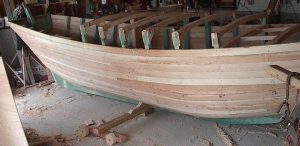 sailing boat in my sister’s garage, and although she was kind enough to host both me and my most recent project, she also treated her neighbours to the sight of my labours. I would often be working in the closed garage, and suddenly the main door would be lifted and my sister would be standing with one or two mute neighbours or friends who would stare like visitors at the zoo. Understandably, I found their silent gawking less than conducive to my work, but it didn’t happen a lot, and they were merely strange. I would say hello, and then they would continue to stare, and finally address my sister and leave. About half of them, however, would offer pithy statements about boatbuilding, and those are the hater comments that I reference above.
sailing boat in my sister’s garage, and although she was kind enough to host both me and my most recent project, she also treated her neighbours to the sight of my labours. I would often be working in the closed garage, and suddenly the main door would be lifted and my sister would be standing with one or two mute neighbours or friends who would stare like visitors at the zoo. Understandably, I found their silent gawking less than conducive to my work, but it didn’t happen a lot, and they were merely strange. I would say hello, and then they would continue to stare, and finally address my sister and leave. About half of them, however, would offer pithy statements about boatbuilding, and those are the hater comments that I reference above.
Over and above the oddness of the social circumstance, some had advice to offer. One man said, as I was 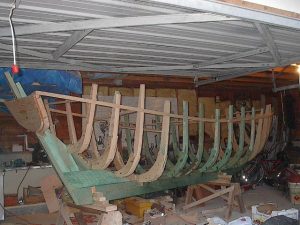 truing up the ribs, “That’s not the way you’re supposed to do that.” I asked if he were a boat builder, and when he said he wasn’t, I laughed and said he must know then. Another man, looking over my partially completed hull with the huge gap in the planking, said, without a hint of a greeting, “That boat will never float.”
truing up the ribs, “That’s not the way you’re supposed to do that.” I asked if he were a boat builder, and when he said he wasn’t, I laughed and said he must know then. Another man, looking over my partially completed hull with the huge gap in the planking, said, without a hint of a greeting, “That boat will never float.”
I wasn’t sure how to respond. 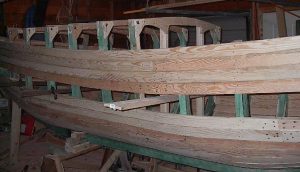 I looked at the boat, trying to see what he saw, and said, “Not at the moment, but I have great hopes for the future.” He said nothing. Then, I added into the lengthening silence, “Luckily, I don’t get a lot of rain in the garage.” When he wandered off, I continued working.
I looked at the boat, trying to see what he saw, and said, “Not at the moment, but I have great hopes for the future.” He said nothing. Then, I added into the lengthening silence, “Luckily, I don’t get a lot of rain in the garage.” When he wandered off, I continued working.
There were many of these instances. One man stood looking at my boat and then starting talking about one ill-fated attempt I apparently needed to know about: “There was a man in Nanaimo who built his own boat. Ferro-cement. The first time he took it out he hit a rock and sunk it.”
With so little context, and no other social cues, such as saying hello or introducing himself, I had nothing to respond to other than his utterance. I wasn’t building in ferro-cement, but rather wood, and I had a hard time discerning what I was meant to take from his anecdote. I finally responded, “What about the Titanic. I hear that didn’t go well.”
“What? What do you mean?” His eyes narrowed at my statement.
“Sorry. I thought we were sharing disaster stories.”
Normally I never troubled myself about the people my sister inflicted on me while I was working. A few of them merely stared or talked to her, and without being addressed, I just kept working. When I went to visit Tara at work, however, I was to have a more in-depth encounter with Kevin.
Tara told Kevin that I was building a boat, and he asked me a few questions about it, and then he said, on the basis of the slimmest of descriptions, that it would never work out. A sailboat is difficult to build, and I would never be able to build a functional one.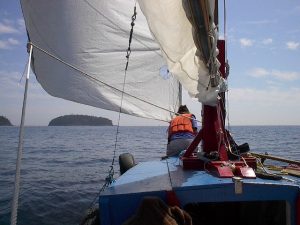
In some ways, he was echoing my own concerns. I was no boat builder or designer, and yet I’d taken the task on. I knew that the boat might not track well on some points of sail, and it might not even be possible to sail it. I also knew that I could drill a hold next to the skeg and mount a motor, so I would still be able to enjoy my boat. My response to Kevin was doubled, however.
“That’s true. It could be that I will screw it up, but at least I will have tried to build a boat.” Then, jumping to the natural conclusion, I began to presume. “Of course there are those people who fancy they are boat people because they own a boat, but all they are is a loser with twenty thousand in their pocket. Any loser with twenty grand can go into a shop and buy a boat, but to build one, however poorly, you have to know what you’re doing.”
Kevin left the lunch table rather abruptly, and afterwards Tara asked me how I knew that he owned a boat. I’d guessed by his insecurities. That was the case with many of the older men who complained that I wouldn’t be able to build my boat. They had dreamed of building one themselves when they were younger, and they had neither the skills, ambition, or intelligence to do so, and now that they were confronted with someone who was doing it, they could only try to tear down what I was doing. When Tara said that Kevin had paid twenty thousand for his boat, I laughed. That was merely a guess. I was going by how he wished to appear as a big shot, and how little his shot really was. The figure I’d come up with was twenty grand. Small wonder he was angry.
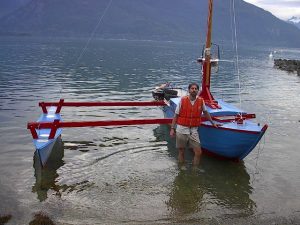 The boat’s reception on the coast was completely different. Marcel helped me assemble the outrigger to put the boat in the water, and he was gushingly complimentary when he saw the way it floated right at the waterline. When I was moored and working on it at Plumper Cove, the park ranger made several positive comments about the accomplishment.
The boat’s reception on the coast was completely different. Marcel helped me assemble the outrigger to put the boat in the water, and he was gushingly complimentary when he saw the way it floated right at the waterline. When I was moored and working on it at Plumper Cove, the park ranger made several positive comments about the accomplishment.
When I came into docks in the different seaside towns, people would stroll over to look at the boat, ask me if I’d built it, ask about the design, and in other was show an appreciation that I’d never seen on land. The workboat people, 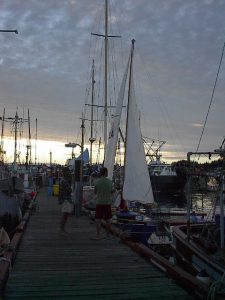 shrimpers and salmon fishers, were especially complimentary. They repaired their own wooden or fibreglass boats, and they admired the frugality of my build and the stability of the multihull. Even the long haul deep sea adventurers, the round the world sailors, gave me a thumbs up, and some of them took pictures which they later emailed to me. one round-the-worlder particularly liked the design. It was an outrigged main hull with the bow and beam of a Marshallese sailing canoe, the stern of a caravel in order to weather a following sea, and the Bermuda rigging of a yacht. I had several live-aboards come up to me with questions as well; they would talk about how they’d built the boat they occupied some twenty years before, and grinned to see that the tradition wasn’t dead. There were
shrimpers and salmon fishers, were especially complimentary. They repaired their own wooden or fibreglass boats, and they admired the frugality of my build and the stability of the multihull. Even the long haul deep sea adventurers, the round the world sailors, gave me a thumbs up, and some of them took pictures which they later emailed to me. one round-the-worlder particularly liked the design. It was an outrigged main hull with the bow and beam of a Marshallese sailing canoe, the stern of a caravel in order to weather a following sea, and the Bermuda rigging of a yacht. I had several live-aboards come up to me with questions as well; they would talk about how they’d built the boat they occupied some twenty years before, and grinned to see that the tradition wasn’t dead. There were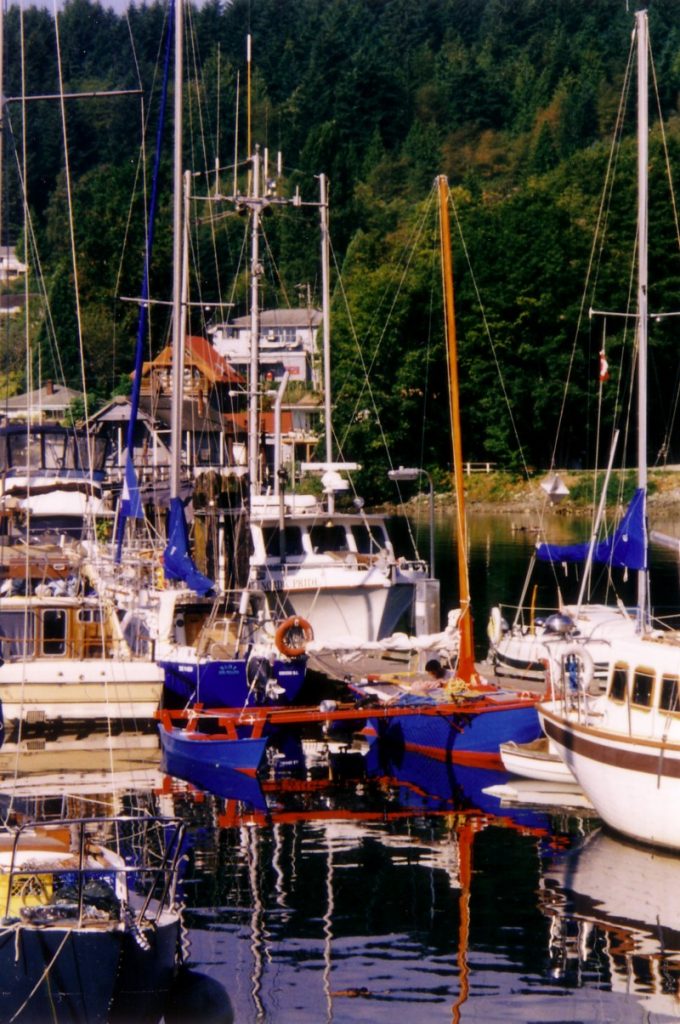 still people willing to risk the naysayers and haters, to carve their own path from the conservative pavement such people had poured over every living thing. One man was reading on his sailboat where we shared the cove at Mink Island commented, when I rowed back from the shore where I’d gone exploring, about how pretty my boat was. He said that every time a gin palace roared past, my boat “pirouetted” around on its anchor rode.
still people willing to risk the naysayers and haters, to carve their own path from the conservative pavement such people had poured over every living thing. One man was reading on his sailboat where we shared the cove at Mink Island commented, when I rowed back from the shore where I’d gone exploring, about how pretty my boat was. He said that every time a gin palace roared past, my boat “pirouetted” around on its anchor rode.
Perhaps the most meaningfully compliments came from children. My boat was bite-sized, and for them it made sailing seem possible. It was immediately apparent what the different elements on the boat were for, and it was small enough 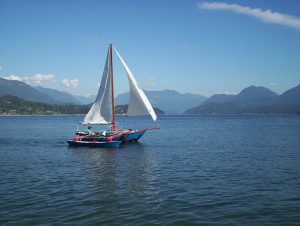 that they could imagine themselves sailing away from the world of adults into a pirate story. Two children came up when I was repairing some gear in Campbell River dock, and they sat beside me on the planks to ask what I was doing, how I’d built the boat, and in other ways expressed their genuine admiration. They stepped aboard at my invite, peered into the narrow cabin, and walked on the deck while holding the rigging. Only when their weekend dad stepped down from his plastic rental gin palace did they scatter. He plunked himself on the dock to join them, but that only served to send them running. He said a few awkward phrases, and then joined his friends and their open bar.
that they could imagine themselves sailing away from the world of adults into a pirate story. Two children came up when I was repairing some gear in Campbell River dock, and they sat beside me on the planks to ask what I was doing, how I’d built the boat, and in other ways expressed their genuine admiration. They stepped aboard at my invite, peered into the narrow cabin, and walked on the deck while holding the rigging. Only when their weekend dad stepped down from his plastic rental gin palace did they scatter. He plunked himself on the dock to join them, but that only served to send them running. He said a few awkward phrases, and then joined his friends and their open bar.
I take from the boat experience, as well as several others, the lesson to ignore and avoid the haters. There are enough people with real insight and knowledge about what we are doing to realize what a labour of love looks like, and who realize the 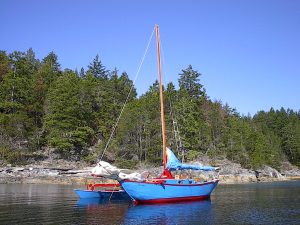 haters will always be sidelined by people with real creativity, ambition, insight, and varied interests. Despite the barking of the haters, the caravan of people who want to be left alone to pursue their own dreams, however doomed or short-sighted, will move on and forget them.
haters will always be sidelined by people with real creativity, ambition, insight, and varied interests. Despite the barking of the haters, the caravan of people who want to be left alone to pursue their own dreams, however doomed or short-sighted, will move on and forget them.
